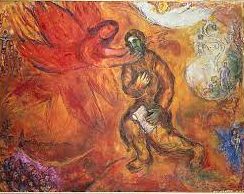 February 6, 2022: May God’s words be spoken, may God’s words be heard. Amen.
February 6, 2022: May God’s words be spoken, may God’s words be heard. Amen.
Like millions of others, I watched the Opening Ceremonies of the Winter Olympic Games that are now taking place in Beijing China. While smaller than others of these ceremonies, it was still amazing to watch. I am one who prefers the Winter Olympics to the Summer Olympics. There is something exhilarating about them – maybe just a bit crazy too. I mean, who thought it was a great idea to ski down a very steep slope and then just leap off into the void below hoping to nail a perfect landing? Seriously? We are used to it now, but somewhere along the lines, somebody had to say “I dare ya to do that,” and somebody else said “Hold my beer!” Nuts!
I remember reading a story once about something that happened at another Winter Olympics long ago – an event I remember well. “In February 1980, the U.S. Olympic hockey team slipped its foot into a glass slipper and walked away with a gold medal at Lake Placid, New York. Those collegians had shocked the world by upsetting the powerful Soviet team, and then they grabbed the championship from Finland while the crowd chanted, “U.S.A.!” Before his team’s victory over the Soviet Union which advanced them to the finals, the coach of the U.S. hockey team told his players, “You are born to be a player. You are meant to be here at this time. This is your moment.””[1]
“You are born to be a player. You are meant to be here at this time. This is your moment.”
They were called. And that is a lot of what we are hearing this week in our scriptures – people being called. We heard it last week too, when the prophet Jeremiah was called by God. This week we hear of the prophet Isaiah being called by God, and Peter, James, and John’s call to follow Jesus.
One of the common themes in our biblical call stories is a huge pushback by those God chooses. Moses didn’t feel up to it because he hadn’t yet taken a Toastmasters International public speaking course. Jeremiah, as we heard last week, said he was just a kid. Jonah doesn’t like the call God wants him to do so refuses – and boy does he pay a price. And, Isaiah feels unworthy as does Peter. And you know what? There is a reason these are often read at priestly ordinations. Most of us felt the same way.
Now, you might be surprised to hear that – maybe thinking that priests have this awe inspiring revelation and we jump out of bed radiantly glowing and ready to serve. Not. For most, if not all of us, we went into it kicking and screaming. Hopefully, we didn’t have an Isaiah or Jonah experience to push us to accept our calling.
Which brings me to that passage about Isaiah we just heard. This comes from what scholars call First Isaiah – the part thought to have been written by the prophet himself, with the rest added on by others. And no, your bibles won’t tell you that, and some will argue for three distinct sections of this book, while others will say it is two, but suffice it to say that the chapter we heard today is in that first part which scholars agree came from before the exile, and was the work of the named prophet, Isaiah ben Amoz, who lived during the second half of the 8thcentury BCE.
And after writing of visions, and prophesying for a few chapters, we get to the passage we heard today. Now, I don’t know what he ate before going to sleep that night, but Lordy – what a nightmare!
This is not some sweet call story of fishing by the sea, or Gabriel coming down and announcing to Mary that she was going to bear a child (though that was a bit frightening), or God calling out to Samuel a bunch of times in the temple while he slept. No, Isaiah says that he saw God sitting on a throne surrounded by Seraphs – creatures with six wings which they used to cover their feet and their face, and to fly around. Holy smokes! Well… and speaking of smoke – there was a lot of that too, and Isaiah is thinking he may have accidently wandered into a place where he shouldn’t be. I mean, ya think? There are six winged flying things everywhere – Lordy! They even start singing, and between the incense, and what they were singing – which sounds a lot like the Sanctus – you would be right there with Isaiah thinking maybe this is some cosmic worship service he stumbled into.
That is when he says he is done for – because he is a creature of earth who has wandered into heaven. Sadly for him, he put it this way “Woe is me! I am lost, for I am a man of unclean lips, and I live among a people of unclean lips; yet my eyes have seen the King, the Lord of hosts!” Unfortunately, the Seraphs are not big on metaphor. They grab a hot coal off the altar with tongs, and burns the guy’s lips off. I bet Isaiah was glad he didn’t mention other body parts as being unclean. The Seraphs, for their part, are like “Hey…now you have no excuse – your sins are blotted out.” So, the hot coals are like the white out of the heavenly realm. Yikes!
It is right at that very moment when God’s says “Seriously – who’s gonna go for me? Who can we rely on to do the work needed to be done on earth?” And Isaiah responds “Hold my beer.” Okay, he actually said “Here Am I, Send Me!” Now we don’t know how that went down. The translation puts an exclamation point at the end, but the Hebrew language doesn’t have any punctuation like that, so it makes you wonder after that whole live coal thing, right? Was it “Me – Send ME!” or more like, Isaiah looking around and seeing no other humans and realizing that God wasn’t being rhetorical, and he was being Volun-told – said “Ummm… me, maybe?”
I think it is more like the latter, because the turn-around from “holy crap what am I doing here” to “holy God – send me” is just a bit too quick. Of course – maybe if the rest of us had six-winged creatures burning our lips off we would respond faster to God’s call too. But slow or quick, the reality is in call stories of scripture – and of the church today, God breaks through our reluctance, our feelings of unworthiness, our stubbornness, our arrogance, our brokenness – to shine through the cracks of our humanity that, as we hear in our Epiphany blessing – our lives may be a light to the world. And the scene Isaiah encounters should lead us to ask – what does it mean to be in the presence of God? What is it we hear in worship – what should it do to us?
Okay, not to worry… I don’t intend to get out the coals we use for incense, light them up and fly around during the absolution that follows our confession putting them on everybody’s mouth – though how cool would that be… the flying I mean, not the coals. But this scene does cause us to reflect on the purpose of our being in worship, or it should.
One of the things about worship is that people who come through these doors experience something transcendent. Through our liturgy, in this space – which is clearly not the office or our home – worshiping with others, experiencing the music, hearing the word, receiving Christ in the Eucharist – through all of that – we encounter God in ways that are both comforting and challenging.
We are nourished, and are made to hunger for peace.
We are lifted in spirit, and made to follow the Spirit to heal a broken world.
We are united one to another as the body of Christ, and sent out to love and serve him where ever he is being crucified today – and he is crucified whenever a child of God is abused, neglected, imprisoned, hungry, lonely, addicted, marginalized, or oppressed.
As I have said often, church is not the destination, it is where you are given strength for the journey. And that’s where we get to this part about call because Isaiah isn’t the only one called – nor am I as your priest. Every single one of you is called too!
You are called by God!
Now, you may be thinking “Here am I God…send somebody else?” You know, like that Far Side cartoon where the two bears can be seen through a hunter’s rifle scope in the woods standing next to each other – one bear is pointing the hunter to the other bear.
Or, you may be thinking “Call? I don’t have time for a call. I don’t even have time for God to text me a cute heavenly emoji right now, dang it. I am up to my neck in alligators with the pandemic. Leave me alone God.”
Or, you might wonder “Ummm….God, can I do this call thing by Zoom in my jammies?”
But nearly everyone who answers a call of God will say two things: They ran from it at first, and they are ever thankful that God finally got through to them.
We usually run from it because we feel the same way that Isaiah felt – not worthy – or ill equipped. I really resonated with Moses in my call struggle – “Anybody but me Lord, seriously – I can’t be a priest.” Yet two things that are often said in clergy circles “God called you to be a priest because God didn’t trust you to be a lay person.” And on a more serious note, “God doesn’t call those who are worthy, God makes worthy those whom God would call.”
“God doesn’t call those who are worthy, God makes worthy those whom God would call.”
Call is about recognizing that every single person on this earth was born for a life of purpose, of relationship with God, of transformational work in the world. What that looks like is different for each of us, and at different times in our lives. That was what St. Paul has been telling us in the passages from his first letter to the Corinthians we have heard over the past few weeks in which he writes about everyone having different spiritual gifts. Your call, and make no mistake about it – you are called – may be to ordained life in the church, or to life vows in a monastic order, but it is even more likely that you are like Isaiah, called to prophetic work in the world.
There’s an old sermon story, I don’t know how accurate it is, but it speaks to this very truth. “In the eleventh century, King Henry III of Bavaria grew tired of court life and the pressures of being a monarch. He made application to Prior Richard at a local monastery, asking to be accepted as a contemplative and spend the rest of his life in the monastery. “Your Majesty,” said Prior Richard, “do you understand that the pledge here is one of obedience? That will be hard because you have been a king.”
“I understand,” said Henry. “The rest of my life I will be obedient to you, as Christ leads you.”
“Then I will tell you what to do,” said Prior Richard. “Go back to your throne and serve faithfully in the place where God has put you.” When King Henry died, a statement was written: “The King learned to rule by being obedient.”” The point of this story is that King Henry wasn’t called to monastic life, but to kingship, and he served God well in the way he ruled from that point forward. Call isn’t about wearing a collar, or living in a convent or monastery, but serving Christ in a myriad of ways in the world.
And one thing that many of these prophets encountered, especially Isaiah, is that life in service to God isn’t easy. Now, you’d think – come on God, I know you can move heaven and earth – heck – you created it all. If you’re gonna call us to serve you in the world why can’t you make it a bit easier? There are many who have done the miraculous – Mother Theresa, the Rev. Dr. Martin Luther King, Jr., Dorothy Day, Archbishop Oscar Romero, and so many more through the centuries. These are people who loved and served Christ, who dedicated their lives to the service of him in the world, and by their acts of faith and great love, by their willingness to follow God’s call, all of us were transformed.
But no one would say that their lives were easy, the road smooth, their end peaceful. Romero and King were assassinated, Mother Theresa served the most desperate of the poor in the slums of Calcutta – where no one else would go. Day fought on behalf of the poor and for a just and peaceful world, which rankled those in power. And as for Isaiah, well even God told him that he would preach, but nobody would listen.
Yet through the ages, God calls us – every one of us – to be the transformative agents we were born to be – no matter our own failings, God redeems us to live a life of meaning, of purpose – God’s purpose. In our worship we are brought into relationship with God, and we are challenged out of our comfort zones to serve. What that looks like for each of us is unique, but one thing is true – we are called – and though the road will likely be challenging, if we are willing to say “yes,” if we trust in God that we are enough and that God will be with us, then we will truly live a life of meaning. For the price of singing “Holy, Holy, Holy,” of worshipping God, is to embody that worship in the world by our acts.
The voice of God is saying to each of you, “You are born to be a player. You are meant to be here at this time. This is your moment.” Saying yes to that call will bring greater rewards than any gold medal. Amen.
[1] Today in the Word, July, 1990, p. 11.
For the audio, click below, or subscribe to our iTunes Sermon Podcast by clicking here (also available on Audible):
The Rev. Diana L. Wilcox
Christ Church in Bloomfield & Glen Ridge
February 6, 2022
Epiphany 5 – Year C
1st Reading – Isaiah 6:1-8, [9-13]
Psalm 138
2nd Reading – 1 Corinthians 15:1-11
Gospel – Luke 5:1-11






